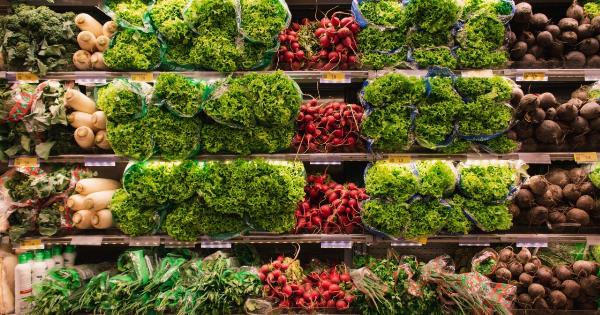The refrigerator is one of the most essential appliances in a modern kitchen. It helps to preserve and extend the life of foods, prevent spoiling, and ensure food safety.
However, not all foods are created equal, and some should be stored in different ways than others. Knowing which foods should be stored in the fridge and which ones can be kept at room temperature can go a long way in ensuring their freshness and taste.
In this article, we’ll take a closer look at when you should put certain foods in the fridge.
Fruits and vegetables
Most fruits and vegetables should be stored in the refrigerator to help prolong their shelf life. However, some varieties, such as bananas, pineapples, and avocados, should be kept at room temperature until they’re ripe.
Once they’ve ripened, you can transfer them to the fridge to slow down the spoiling process. Here’s a list of some commonly consumed fruits and vegetables:.
Vegetables
- Broccoli
- Carrots
- Celery
- Corn
- Lettuce
- Mushrooms
- Peppers
- Spinach
- Zucchini
Fruits
- Apples
- Berries (strawberries, blueberries, raspberries, etc.)
- Grapes
- Oranges
- Pears
- Peaches
- Plums
Dairy products
Dairy products are very perishable and should be stored in the refrigerator immediately after purchase. This includes milk, cheese, yogurt, and butter.
When storing cheese, be sure to keep it in a sealed container or wrap it tightly in plastic wrap to prevent it from drying out.
Meat, poultry, and fish
Meat, poultry, and fish are highly perishable and should be stored in the refrigerator immediately after purchase to prevent spoilage and the growth of harmful bacteria.
Store them in the coldest part of the fridge, usually the back and bottom shelves or the meat drawer. If you’re not planning on cooking them right away, you can also freeze them to extend their shelf life.
Bread and baked goods
Bread and baked goods can be stored at room temperature for a few days, but they’ll last longer if you store them in the fridge. You can also freeze them for longer-term storage.
Canned or jarred goods
Canned or jarred goods typically don’t need to be refrigerated unless they’ve been opened. Once opened, you can transfer them to a container with a lid and store them in the fridge.
Condiments and dressings
Most condiments and dressings can be stored in the pantry or fridge, depending on the manufacturer’s instructions. However, if you’ve opened them, it’s best to store them in the fridge to prevent spoilage and the growth of bacteria.
This includes ketchup, mustard, mayo, salad dressings, and sauces.
Nuts and seeds
Nuts and seeds can be stored in the pantry for a few weeks, but they’ll last longer if stored in the fridge or freezer. This is especially true for nuts that are high in natural oils, such as walnuts, almonds, and pecans.
Storing them in the fridge or freezer will help prevent rancidity.
Final thoughts
Knowing when to put certain foods in the fridge can help extend their shelf life, prevent spoilage, and ensure food safety.
Be sure to follow the manufacturer’s instructions and store foods in the correct temperature range to prevent the growth of harmful bacteria. By taking care when storing your food, you’ll be able to enjoy fresh and delicious meals for longer.


























